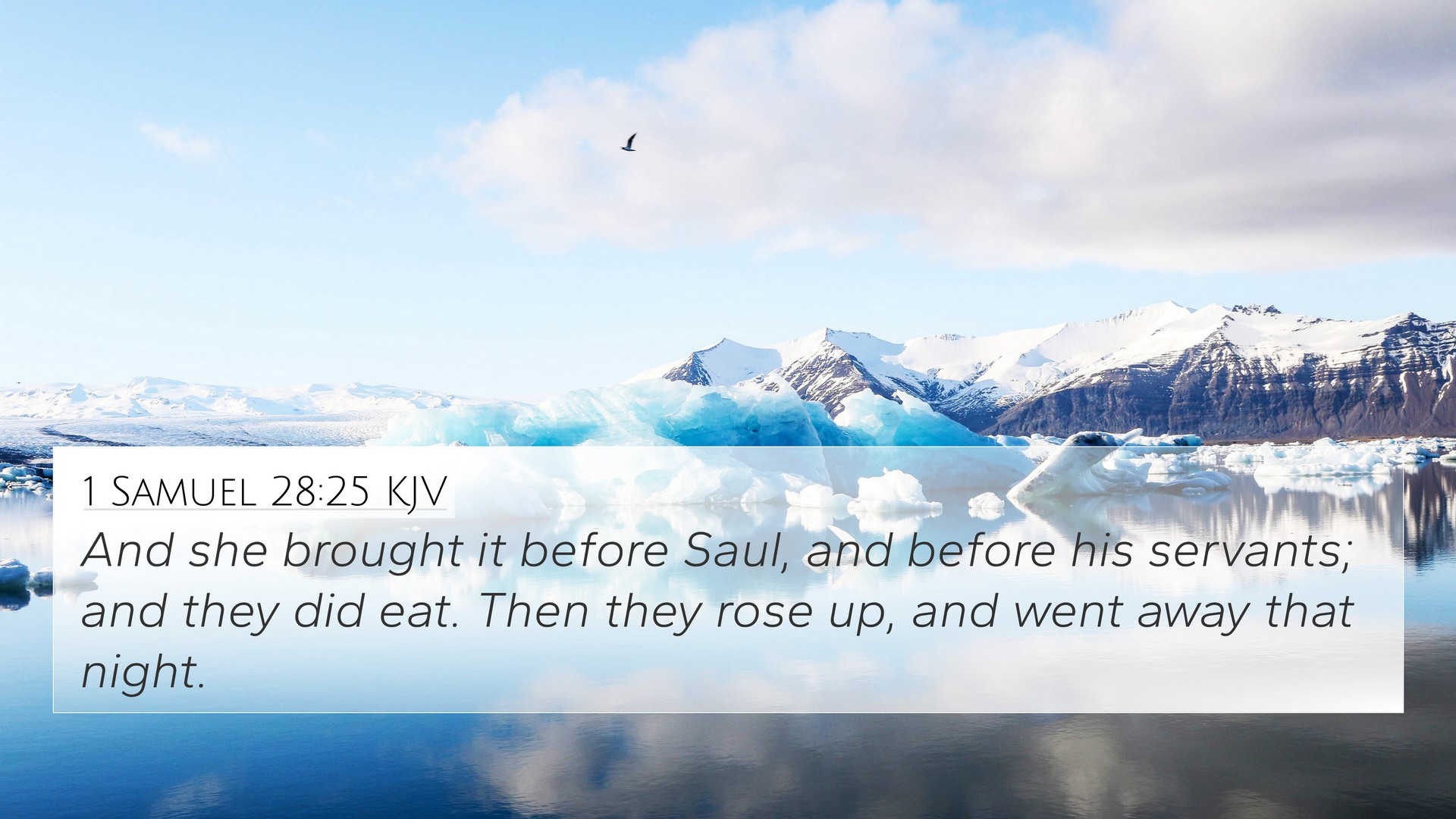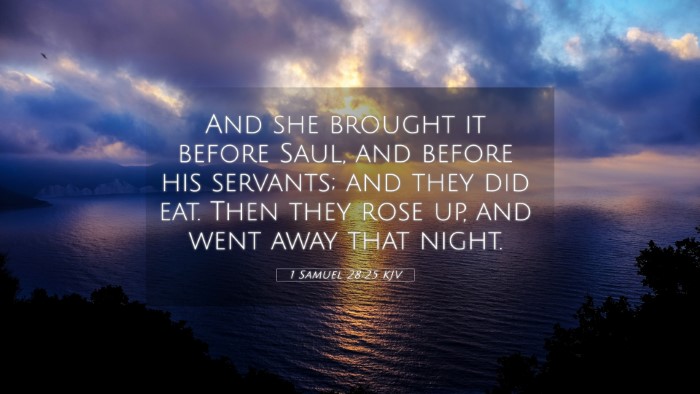Meaning and Interpretation of 1 Samuel 28:25
1 Samuel 28:25 reads: "And she brought it before Saul, and before his servants; and they did eat. Then they rose up, and went away that night." This passage occurs at a pivotal moment reflecting Saul's desperation and the profound consequences of his choices. Below, we provide a comprehensive examination of the verse, utilizing insights from various public domain commentaries to enhance understanding.
Verse Context
In this verse, Saul's visit to the medium at Endor to consult the spirit of deceased prophet Samuel illustrates his dire situation. He was at a crossroads after being abandoned by God, pursuing supernatural means to gain insight about his future. Historically, this moment marks the culmination of Saul's tragic decline from a once-anointed king to a desperate figure seeking forbidden knowledge.
Insights from Commentaries
-
Matthew Henry:
Henry indicates that the act of eating before the medium demonstrates Saul's willingness to abandon his dignity in exchange for knowledge. He emphasizes the irony of Saul seeking guidance from a source that is expressly forbidden for an Israelite. Henry notes this as a point of reflection on the lengths to which people may go when feeling abandoned by God.
-
Albert Barnes:
Barnes comments on the spiritual implications of Saul's actions, highlighting the desperation that led him to consult a medium. He points out that this was an act contrary to the law of Moses, signifying Saul's complete disregard for divine commandments. Barnes underscores that this meal in a sinister setting represents a stark turning point in Saul's life.
-
Adam Clarke:
Clarke provides a historical background, discussing the relevance of retaining Mahlah, the offerings brought forth. He interprets the significance of the meal shared with the medium as Saul's betrayal of divine trust, converting a sacred act into one of ritual defiance against God. Clarke insinuates that the meal symbolizes the temporary relief Saul gains, masking the perilous depths of his spiritual decay.
Thematic Connections
This verse serves as a crucial theme in exploring the conflict between obedience to God and personal desperation. Several Biblical themes echo through this narrative:
- Desperation leading to moral compromise
- The consequences of seeking knowledge outside God's intended means
- Rejection of divine guidance leading to downfall
Cross-References
1 Samuel 28:25 connects deeply with a number of other scriptures, enriching its meaning and providing inter-Biblical dialogue. Here are some pertinent cross-references:
- Deuteronomy 18:10-12 - Law prohibiting sorcery and mediums
- 1 Chronicles 10:13-14 - The consequences of Saul's unfaithfulness
- 1 Samuel 15:26 - God rejecting Saul, emphasizing divine abandonment
- Isaiah 8:19-20 - A warning against consulting the dead for guidance
- Galatians 5:20 - Describing sorcery as a work of the flesh
- Luke 16:26 - The chasm between the living and the dead
- Acts 16:16-18 - Paul confronting a spirit of divination
Comparative Bible Verse Analysis
Understanding the connections between Bible verses leads to deeper insights:
- Identifying connections between Old and New Testament: The theme of God’s guidance versus seeking worldly wisdom is echoed throughout both testaments, fundamentally communicating the principle of reliance on divine wisdom.
- How do Saul's actions parallel Judas’ betrayal (Matthew 27:3-5)? Both figures acted out of desperation, leading to grievous choices against previously held faith.
Practical Application
The implications of 1 Samuel 28:25 encourage deep self-reflection regarding the sources from which we seek guidance. In moments of despair, believers are urged to turn to scripture and prayer rather than worldly avenues that lead away from divine trust. Tools for Bible cross-referencing, such as concordances and cross-reference guides can aid individuals in navigating these connections.
Conclusion
This examination of 1 Samuel 28:25 reveals the gravity of Saul's choices and their theological implications. By engaging with cross-referenced themes and insights from biblical commentaries, we foster a richly layered understanding of scripture, one that warns against the dangers of abandoning divine trust in challenging times.


